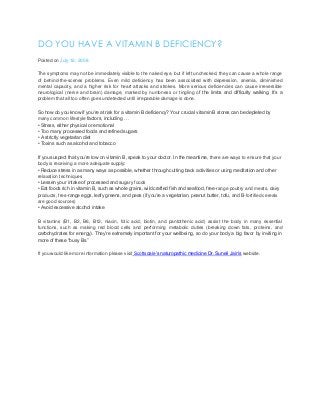Do You Have A Vitamin B Deficiency | Rejuvena
- 1. DO YOU HAVE A VITAMIN B DEFICIENCY? Posted on July 16, 2008 The symptoms may not be immediately visible to the naked eye, but if left unchecked, they can cause a whole range of behind-the-scenes problems. Even mild deficiency has been associated with depression, anemia, diminished mental capacity, and a higher risk for heart attacks and strokes. More serious deficiencies can cause irreversible neurological (nerve and brain) damage, marked by numbness or tingling of the limbs and difficulty walking. It’s a problem that all too often goes undetected until irreparable damage is done. So how do you know if you’re at risk for a vitamin B deficiency? Your crucial vitamin B stores can be depleted by many common lifestyle factors, including … • Stress, either physical or emotional • Too many processed foods and refined sugars • A strictly vegetarian diet • Toxins such as alcohol and tobacco If you suspect that you’re low on vitamin B, speak to your doctor. In the meantime, there are ways to ensure that your body is receiving a more adequate supply: • Reduce stress in as many ways as possible, whether through cutting back activities or using meditation and other relaxation techniques • Lessen your intake of processed and sugary foods • Eat foods rich in vitamin B, such as whole grains, wild crafted fish and seafood, free-range poultry and meats, dairy products, free-range eggs, leafy greens, and peas (if you’re a vegetarian, peanut butter, tofu, and B-fortified cereals are good sources) • Avoid excessive alcohol intake B vitamins (B1, B2, B6, B12, niacin, folic acid, biotin, and pantothenic acid) assist the body in many essential functions, such as making red blood cells and performing metabolic duties (breaking down fats, proteins, and carbohydrates for energy). They’re extremely important for your wellbeing, so do your body a big favor by inviting in more of these “busy Bs.” If you would like more information please visit Scottsdale’s naturopathic medicine Dr. Suneil Jain’s website.

